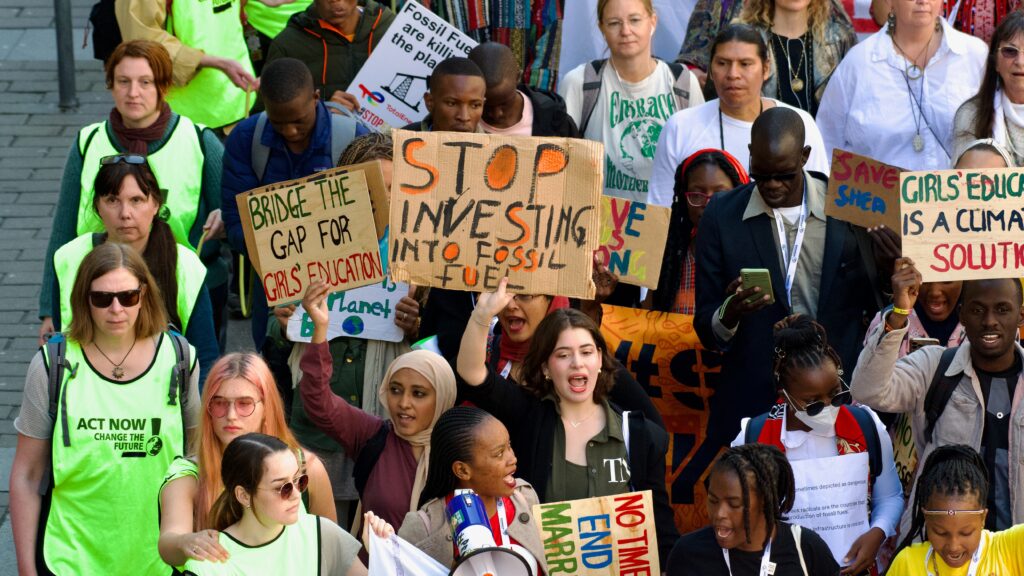Analysis | February 2023
What funders need to know about civic space in 2023

Source: Shutterstock, Climate Protestors in Sweden
Analysis | February 2023

Source: Shutterstock, Climate Protestors in Sweden
At the start of this new year, Civic Futures is looking ahead to the real-world effects of the security playbook, which has been accelerating the closing of civic space over the past twenty years, and the opportunities for donors to slow down and reverse this closure.
What brings us together as Civic Futures is a vision of a world where people can gather freely and safely to protest, demand accountability, and advocate for democracy and human rights, equality and environmental protection without fear of being criminalized, surveilled or falsely labelled as security threats. Now, we invite you to join a cross-sector community of donors working closely with civil society groups and movements to realise this shared future.
Governments on every continent are using a playbook of anti-terror laws, surveillance and censorship technology and smear attacks to restrict activism, protest and dissent on the grounds of national security. We call this the ‘security playbook’. In reality, these strategies undermine the foundations of democracy and rule of law; freedom of expression, freedom of association and freedom of assembly. These concerted attacks on our rights receive little joined-up scrutiny, have extraordinary momentum, and threaten every sector, every issue, every movement – from climate justice and environmental rights to racial and gender justice and youth movements.
The coming decade will see real-world effects of this security playbook on a diversity of activism and struggles. In the coming year, we expect movements mobilising to tackle the climate crisis and democratic backsliding will face the brunt of security-justified measures.
Climate
The climate and environmental justice movements are key for holding governments and corporations to account as we work to slow down the disastrous effects of the climate crisis globally. We anticipate seeing the increased securitisation of the climate crisis in two ways this year:
Democracy
Pro-democracy and anti-authoritarian efforts to reverse democratic backsliding across the world, plus those fighting for fairer living in the wake of the economic downturn, are continuing to be suppressed by governments who are introducing, or reinforcing existing, securitised measures. We have seen examples of this in Belarus, where the government continues to suppress any dissent through bogus prosecutions and harassment of human rights defenders, journalists, lawyers, opposition politicians and activists, with thousands of people facing prosecution in connection with the 2020 mass protests.[3] In Myanmar, over 16,000 pro-democracy activists have been arrested, with thousands more dying at the hands of security forces[4]
Covid-19 has accelerated this trend as autocratic leaders use the pandemic to provide cover to repress peaceful activists and critics. The International Center for Not-for-Profit Law’s Covid-19 Civic Freedom Tracker has mapped 62 countries with pandemic response measures affecting freedom of expression, 62 with measures affecting privacy, and 156 with measures limiting assembly. Many of these adapt and use laws introduced after 9/11. The scale of the public health emergency warranted unprecedented measures, but there is evidence of governments using these powers to curtail dissent (see: increased surveillance of #EndSARS activists in Nigeria, climate activists in France being investigated by the country’s counter-terrorism unit).
At Civic Futures, we believe that by working together we can reverse the shrinking of civic space. By building a donor ecosystem to resource civil society, we can address the use of the security playbook as a driver of closing civic space. We are collaborating with other funders and civil society partners that want to change the status quo and look to not just fight the fires caused by states’ security responses but also support organisations, academics, think tanks and movements which challenge the root causes. There are so many opportunities to safeguard civic space in the future, from supporting the ethical use of new technologies to protecting the right for protest across multiple jurisdictions and implementing initiatives in the fields of narratives and strategic communications.
In 2023, there will be many opportunities for funders to engage with this work across a range of related topics, from an international and domestic lens. Whether you’re new to these issues or already engaged in them, Civic Futures has a key line-up of publications and events to further support donors in their efforts to initiate and continue their work in the intersecting field of civic space and the security playbook.
Ready to get involved? Need more information? You can contact us here.
Poonam Joshi, Director, Funders Initiative for Civil Society and James Savage, Program Director, Fund for Global Human Rights